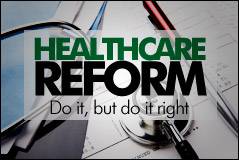Media
State Officials Have the Power to Stop Federal Health Care
 The Supreme Court health care ruling last week gave Pennsylvania two opportunities to undermine the Affordable Care Act. States can decline to set up a state exchange and choose not to expand Medicaid to those above the federal poverty line.
The Supreme Court health care ruling last week gave Pennsylvania two opportunities to undermine the Affordable Care Act. States can decline to set up a state exchange and choose not to expand Medicaid to those above the federal poverty line.
By voluntarily participating in the exchange or the Medicaid expansion, state officials will not only cost taxpayers billions, they’ll strengthen the law by making it harder to repeal.
Pennsylvania has nothing to lose by refusing to create an exchange. As we’ve explained in the past, state control is a mirage. The U.S. Department of Health and Human Services can change the rules at any time.
State exchanges are the heart and soul of the ACA, they’re how the individual mandate and employer penalties will be enforced. Without state exchanges, the ACA begins to unravel as the bankrupt federal government is forced to create and fund exchanges.
Costly Medicaid expansion could be even more harmful to Pennsylvanians than a state exchange. The feds will pay over 90 percent of the costs through 2020, however, the expansion is still estimated to consume $2 billion in state tax dollars from 2014-2019. And this estimate doesn’t include the costs states could incur from people who are already Medicaid eligible but have not signed up.
The last thing we should do is consign more Pennsylvanians to a broken system. Medicaid is characterized by long waits for appointments, regular emergency room use and lower survival rates than the uninsured. If officials truly care about health care access for the needy, they should seek a waiver to reform the Medicaid program.
Governor Corbett and the legislature should follow the lead of other Republican governors, like Rick Scott in Florida and Nikki Haley in South Carolina, who have refused to help the federal government bankrupt their states. Pennsylvanians deserve more consumer choice and control, not more government intervention further driving up the cost of care.